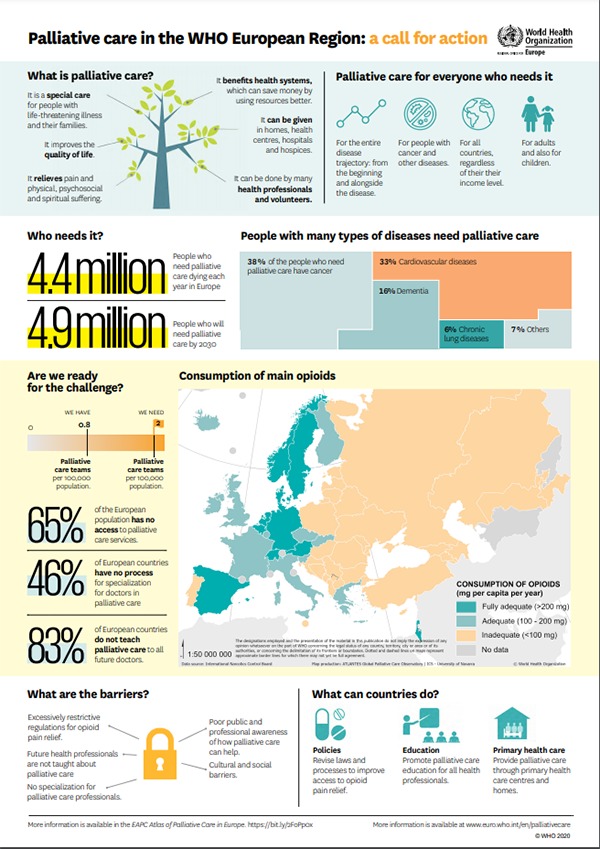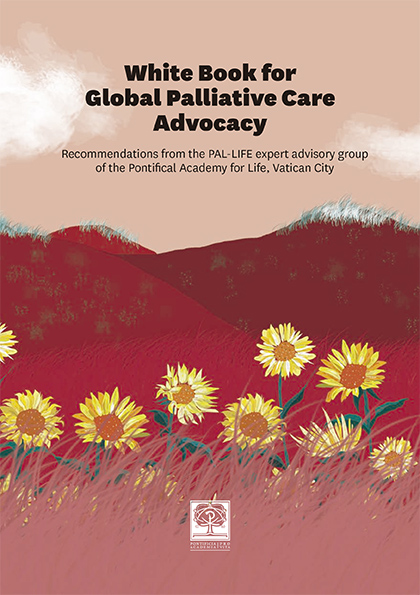The estimates are real and recent. Every year in Europe more than four million people need palliative care. But in a few years they will be almost five million patients will require this specialized care in the face of severe suffering due to their illness, according to estimates by the World Health Organization (WHO).) realized in 2020.
Thirty-eight percent will have oncological diseases, cancer; 33 percent, cardiovascular; 16 percent, variants of dementia; 6 percent, chronic; and 7 percent, other.
In a global perspective, David Clark, of the University of Glasgow, and other professors and physicians, studied the state of palliative care in 198 countries in 2019. Among their conclusions, they noted that "palliative care at the highest level of provision is available to only 14 % of the world's population and is concentrated in European countries."
Facilitating access to palliative care
The experts added their forecast of "a global growth of 87 % in severe health-related suffering amenable to palliative care interventions by 2060.". However, in his opinion, despite this growing need, "palliative care is not reaching the levels required by at least half of the world's population." (Mapping Levels of Palliative Care Development in 198 Countries: The Situation in 2017, published in Journal of Pain and Symptom Management).
For example, in Spain, of the more than 220,000 people who died in recent years in need of palliative care, it is estimated that around 80,000 died without access to palliative care.according to data from the Spanish Society of Palliative Care (Secpal). Moreover, it is a service that will be needed by around 50 % of the population at the end of their lives.

The reality is that "Greater access to palliative care could greatly alleviate the pain of millions of people. Palliative care should be a right, not a privilege of the few."a report in the magazine Our Time just before the outbreak of the pandemic early last year.
"Today euthanasia is demanded in society, even in law, for many things that have a solution. Medicine also has many things to say in the face of suffering that at times can be intolerable. Medicine has something, and I know it is effective, because I have seen it in action so many times", has assured Omnes the doctor Carlos Centeno, director of Palliative Medicine at the Clínica Universidad de Navarra and of the Atlantes research team of the Culture and Society Institute (ICS) from the same university, who has participated in the Glasgow report, in recent studies for the WHO, and also for the Vatican.
Support from the Holy See
The concern of the Holy See in support of palliative care, that is, comprehensive care of patients with intense suffering in a serious illness, in an interdisciplinary manner, in order to maintain their well-being and quality of life, is notorious. In 2019 the White Book for Global Palliative Care Advocacy, a White Paper in which experts from around the world, convened by the Pontifical Academy of Life and coordinated by Atlantes, studied ways to promote palliative care..

At the end of the work, it was recorded in the document that "the scientific community of palliative care recognizes the important role of religions in promoting this form of care for the sick., given the ability of religions to reach out to the peripheries of humanity, those who, within a community, are the most needy". Pope Francis was also quoted, in his description of the culture of the "discard" in the Apostolic Exhortation Evangelii gaudiumn. 53, and it was stated for the record that "religious faiths support the principles of palliative care to relieve pain and suffering approaching the natural end of life."
"The hope is that all religions, in an active way, will support the palliative care movement." concluded the document, "offering their valuable contribution of wisdom to achieve a culture of accompaniment that is truly inclusive and respectful of the dignity of every human being.".
Human dignity was alluded to a month and a half ago José María Torralbadirector of the Core Curriculum Institute of the University of Navarrain a conference on on line organized under the title Science and values of palliative care. The professor emphasized that human dignity shines in a special way in the activity of caring for another person. "The Problem, he added, "It is the dominant utilitarian mentality, for which caring is a waste of time, because life is seen in terms of performance and success. Our society needs to recover the awareness that we are weak beings in need of care"..
He has also referred to the dignity Tomás Chivato, Dean of the Faculty of Medicine and Professor of the CEU San Pablo University. "Dignity is intrinsic to every human being." "it is preferable to speak of a dignified life and not of a dignified death".he points out. In his opinion, "if a person feels like a burden or that he or she is useless, he or she may feel that his or her life is meaningless. Conversely, when someone feels loved, appreciated and accompanied they don't feel like someone 'unworthy'".







